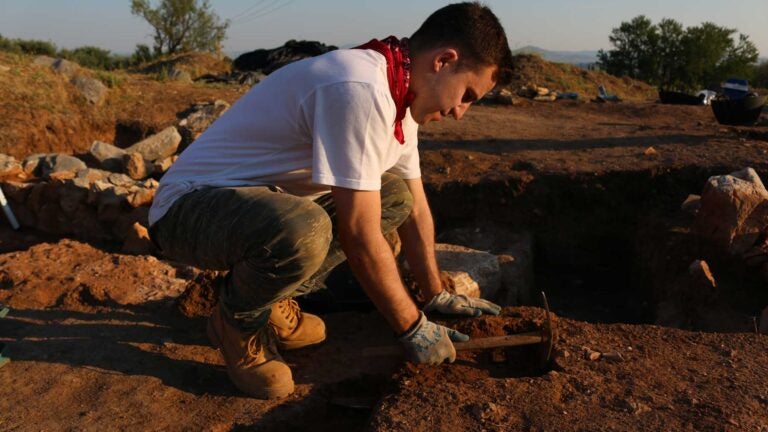
Student finds ancient Greek sword in Thebes — just another day on a dig
Overseas research opportunities, like the one in which Max Novak unearthed a centuries-old sword, help the department expand its reach
Max Novak kneeled over a plot of dirt, slowly digging and wiping away, centimeter by centimeter.
Novak, 22, was in the Greek city of Thebes — the site of so much ancient Greek mythology — taking part in an archaeological dig where a sanctuary of Poseidon once stood.
This day, he’d been working for about five hours when he found it.
“As I was digging in the periphery, I noticed the tip of this thing,” said Novak, who graduated in the spring. “I tapped on it and it had a metallic sound.” It was a bronze sword, likely from the Hellenic period, fourth-third century B.C.
Novak used brushes and a small stick to scrape away sediment, then slowly lifted it out.
This summer trip was possible due to the Kallins Hellenic Studies Summer Fellowship, a new opportunity for undergraduate and graduate research and travel through the Classics Department at the USC Dornsife College of Letters, Arts and Sciences. Novak, who studied classics and art history, was one of three students receiving the fellowship for the first time.
The award is open to anyone who has taken a course in classics, regardless of their declared major, as a way to encourage students to study Greek history firsthand.
Pushing boundaries
In addition to the Kallins Fellowship, there’s also the Bhutani Family Summer Research and Travel Fund, a smaller award available for an undergraduate. Both awards fall in line with the school’s push to expand the classics beyond the confines of the department.
It’s a way of getting students interested in not just the classics, but in the liberal arts.
Greg Thalmann
“It’s a way of getting students interested in not just the classics, but in the liberal arts,” said Professor Greg Thalmann, a department chair.
Each year, three Kallins awards for $5,000 each are given for study in Greece. That can go toward a dig, university research or other types of field work.
Classics PhD candidate Afroditi Manthati-Angelopoulou studied the history of emotions in Plato and Greek tragedy in Athens. Joshua Allbright, also pursuing a doctorate in classics, went to Crete and Athens to research gay men, learning how they view their Greek identity in terms of their sexuality and the culture’s ancient past. He conducted roughly a dozen interviews in Greek.
“It’s important to get these outside perspectives. It really makes you think in ways you didn’t think were possible,” Allbright said of the firsthand experience. “Being in Greece always reminds me why I do the work that I do.”
Transformative experiences
Thalmann himself can vouch for the value of such experiences.
“I spent a year there as a graduate student and it transformed my life,” he said. “To go there and see the layers — see one culture on top of another, literally. I’m still using what I learned in that year in Greece in both teaching and researching.”
According to the Association of American Colleges and Universities, being able to participate in research can make students more motivated in their coursework, feeling better about thinking independently and developing ideas.
Novak’s participation in archaeological digs reinforced his interest in archaeology and material culture, he said. He’s now at the University of Oxford in a master’s program that combines classical art and archaeology.
It’s amazing to be able to experience archaeological artifacts outside of a museum.
Max Novak
“It’s amazing to be able to experience archaeological artifacts outside of a museum,” Novak said. “It’s one thing to see it cleaned up as an artifact in a museum but another to pull it out of the ground, seeing it covered in dirt and thousands of years old.”
And the sword? It was photographed, bagged and stowed away for study and posterity.
